1. Regional context
Latin America and the Caribbean are going through a very unique moment in political and economic matters. Much like the rest of the planet, this region has been receiving the effects of the last global capitalist crisis for years, to which we must add the calamitous vicissitudes of the Covid19 pandemic. It’s a moment of certain optimism, of hope and always of social struggle, however, we can’t assure right off the bat that it’s the return of the Latin American left to power: it’s not a repetition of the so-called “decade won” with which we inaugurate the XXI century. It’s not that simple. It cannot be, for the simple reason that history never repeats itself.
However, several recent political events in this region seem to be materializing agreements between new actors and factors of power in consolidation to withstand pressures from the North. It’s also undeniable that these efforts have been effective in this regard, the fact that China already has its own dynamics and strength, supremacy that has demonstrated both in multilateral forums and in bilateral matters, negotiating country by country, advancing in cooperation projects that many times before they were projects that carried the USAID seal. This last factor has weighed on the region, especially because the United States spends great energy and effort trying (unsuccessfully) to stop the Chinese advance.
The 2019 protests in Chile, which led to questioning the neoliberal direction that the trans-Andean country had followed since the overthrow of Salvador Allende in 1973, were joined by unprecedented protests in Colombia also due to a new attempt by the parricidal government of Ivan Duque to apply against the Colombian people a predatory and unsustainable fiscal plan. In Chile, in 2021, a new Political Constitution will be drafted that will forever bury the Pinochetist constitution; in Colombia, however, the struggle is still to take place and the violence of the State continues to increase the violation of Human Rights and to assassinate political leaders, however, in vain, because every Colombian who is born carries a thirst for justice in his veins and will continue to resist until a new dawn arrives in that country.
In Brazil, Jair Bolsonaro continues his irremediable course towards the decline of his disastrous mandate, which has been characterized by his servility towards the United States, and more specifically towards Donald Trump. The people of the South American giant have already condemned the current tenant of the Planalto Palace, the terrible results that anti-vaccine denial against Covid19 has had on the Brazilian population have left Bolsonaro poised for a dishonorable exit. Although it’s true that the economic power of Brazil and the dominance that the current administration has over the mass media play in favor of the possibility of Bolsonaro continuing to hold power, an enormous political figure has appeared to challenge his reign: Luiz Inácio Lula da Silva.
On the other hand, it’s clear that several leaders of Latin America and the Caribbean have “finally” begun to understand that the Organization of American States (OAS), and especially that the General Secretariat, the executive organ of the OAS, has long ago ceased to represent the region, where each Latin American country could be respected in its self-determination and in its sovereignty. The OAS was born as the counterpart of the United Nations (UN) in our region, but – without being integrated by the United States and Canada, in theory it would be more democratic, there would be no such thing as a “Security Council”, each country would have equal voice and vote, and there would be no veto power. However, the OAS today is an instrument of US imperialism. Its officials are, from the Secretary General to the political analysts who work there or in other organs of the OAS, all designed and programmed to function that way (I also know this because I have worked there…).
We say “finally” because already at the beginning of 2010, President Hugo Chávez had declared: “The OAS is useless” referring to the fact that it had not been up to the task to deplore the coup in Honduras and against the constitutional president Manuel Zelaya among other reasons. Chávez even called the OAS: “The US ministry of the colonies,” that is, the Venezuelan leader denounced the role of an interventionist instrument of the American organization. From that moment on, Venezuela legally initiated efforts to abandon that obsolete space forever. The departure of Venezuela from an organization that was betraying its foundational foundations and its purpose for being, was criticized (and still is). However, recently several countries such as Mexico and Peru have set a position on a par with Bolivia, Cuba, Nicaragua and Venezuela. Because the truth is that the power that the USA exercises in the OAS is shameless, in addition to having co-opted its Secretary General, the Uruguayan Luis Almagro.
Finally, we have the arrival – and the return – to power of progressive and revolutionary governments, some through coalitions of political parties and others with parties that burst onto the scene as a sign of the exhaustion of the neoliberal model in Latin America and as a symptom of weakening of US imperialism. Among the first political spaces, we have “Juntos Haremos Historia”, in Mexico, which guaranteed the arrival to the presidency of Manuel López Obrador, in 2018, as well as the “Frente de Todos”, political forces led by Kirchnerism, and that managed – through Alberto Fernández and Cristina Fernández, to recover the Casa Rosada in 2019. Then we have the revenge of the Movement to Socialism (Movimiento al Socialismo – MAS), which democratically defeated the coup against Evo Morales, the Bolivian people rose in popular victory Luis “Lucho” Arce in 2020. But without a doubt, the most unthinkable case was carried out by the left-wing Free Peru Party (Libre Perú), which managed – against all odds – to prevail in the recent presidential elections in June 2021, and catapulted a humble teacher to the Casa de Pizarro, from where Pedro Castillo holds the presidency, who among his first measures decided to withdraw Peru from the Lima Group (another organism of the regional right that is in frank decline).
2. Venezuelan national context
The aforementioned political events in Our America are some of the events in the regional and international context that made it possible to establish new channels of dialogue between the Government of President Nicolás Maduro and the leaders of the Venezuelan opposition. Of course, there are also internal factors that worked in favor of starting these negotiations, mediated by Norway, with the accompaniment of Mexico, the Netherlands and Russia. On the part of the Bolivarian Government, the holding of the legislative elections in December 2020, and the recent open primary elections (EPA) express Venezuela’s commitment to democracy which, in this case, is not a representative democracy, but “Protagonist and participatory”, in accordance with the provisions of the current Constitution of 1999 called by Hugo Chávez and approved by the Venezuelan people through two plebiscites, in which all citizens participated.
And, speaking of citizenship, the most important factor of all has been the Venezuelan people, the most affected by the economic, financial and commercial blockade of the United States and other Northern powers against the homeland of Miranda, Bolívar and Chávez. No doubt, the Venezuelan people are not a monolith, they are also diverse, heterogeneous, complex and even contradictory, but absolutely all the people have seen their lives affected by imperial harassment, although a part of the Venezuelan citizens remains oblivious to political affairs trying to procure their livelihood and only focused on it, a good part of the Venezuelan people, who also suffer from economic strangulation, have remained politically conscious and have remained on the streets in defense of the Bolivarian Revolution. In short, if today in 2021, there is a Bolivarian Government, it is because there are Chavista people in the streets.
3. Objectives of the dialogue process
Thus, we come to August 13, in Mexico City, where the Government of the Bolivarian Republic of Venezuela, represented by the president of the Venezuelan Congress, Jorge Rodríguez, and the head of the Unitary Platform of Venezuela, Gerardo Blyde, who would be here representing Juan Guaidó, met to agree on the following Agenda:
1. Political rights for all.
2. Electoral guarantees for all. Election schedule for observable elections.
3. Lifting of sanctions. Restoration of rights to assets.
4. Respect for the Constitutional State of Law.
5. Political and social coexistence. Renounce violence. Reparation for victims of violence.
6. Protection of the national economy and social protection measures for the Venezuelan people.
7. Guarantees of implementation, monitoring and verification of what has been agreed.
Similarly, both parties agreed to the following negotiation terms:
a. Objective of a comprehensive negotiation
The objective is to reach an agreement, through intense, comprehensive, incremental and peaceful negotiation, to establish clear rules of political and social coexistence, with absolute respect for the National Constitution.
b. Method
The negotiation will take place under the principle that nothing is agreed until everything is agreed. However, the parties may enter into partial agreements if they consider that the subject on which they relate has been sufficiently discussed and if its implementation is urgent, necessary or, at least, verifiable before the end of the negotiation.
Early partial agreements will be included in the final agreement and will be irreversible from their issuance, without prejudice to the possibility of adjusting them to the circumstances or improving them, taking into account, among other things, the principle of progressivity.
c. Representation
Each party will designate its delegation of nine (9) members. It will endeavor to include women in delegations.
d. Participation
Consultation mechanisms with other political and social actors will be established.
This new round of negotiations between Chavismo and the opposition pursues several objectives, the most evident is to reach the next elections in November 2021, with agreements that favor the participation of most of the political groups that exist in Venezuela, that is, this objective seeks to strengthen the national democratic system; But, we would say that the maximum objective that the Bolivarian Government is seeking – at least the Bolivarian Government – is the lifting of unilateral coercive measures, to end the suffering of millions of Venezuelans, men and women, who see their human rights restricted, basic rights such as food, health, housing, education, transportation, that is, to have the quality of life that they deserve, that every human being deserves. In our opinion, all of this depends 90% on the lifting of the criminal sanctions maintained by the United States government and allowing Venezuela to reactivate its productive and commercial apparatus on equal terms with the rest of the nations. of the world system and in all the markets of the planet.
4. Prospects
The first thing that can be observed looking prospectively is that the political and social forces led by President Nicolás Maduro will arrive at the next elections legitimized and strengthened by the negotiation process started in Mexico City. Something that could already be envisioned during the recent holding of the Bicentennial Congress of the Peoples of the World, held in the city of Caracas between June 21 and 24, an event that brought together a massive demonstration of international solidarity with the Bolivarian Revolution to thousands of referents of the social struggles and revolutionary forces of the world.
Contrary to what is happening at the front of the forces allied to the Bolivarian Government, the Venezuelan opposition is increasingly fragmented and weakened. As is the case with the figure of Juan Guaidó (about whom we ask ourselves: Why did he not participate in the meetings in Mexico?) There all the conditions and guarantees were given to his person, however, Guaidó neither appeared nor signed the Memorandum of Understanding, he only dedicated himself to sending his usual videos proclaiming his “good intentions” and warning about “the dictatorship that governs Venezuela”, without assuming any responsibility for the suffering of the Venezuelan people. It seems that Guaidó, along with the president of El Salvador Nayid Bukele, are heading to rule the world from cyberspace.
It’s also very likely that, regardless of the progress or obstacles that arise in this new dialogue between Chavismo and the opposition, this opposition, represented by Gerardo Blyde, the chief negotiator of the Unitary Platform of Venezuela, and other sectors of the opposition (political parties and coalition) ensure and confirm their participation in these upcoming general elections. Honestly, there are few things that mobilize the citizens in Venezuela so much as the electoral processes: November will be the 27th election, in a few more than 20 years of the Bolivarian Revolution. It can be said that it is already in the nation’s DNA.
Outside the domestic perspectives, it should be noted that the Secretary of State of the United States, Antony Blinken, together with the High Representative for Foreign Affairs of the European Union, Josep Borrell, and the Chancellor of Canada, Marc Garneau, Chancellor of Canada, issued a Joint Statement in which they stated that “they could review the sanctions policies if the Government of Nicolás Maduro made significant progress.” On this point, it must be said that such a statement reveals, once again, that the economic sanctions are intended to attack the Government of President Maduro and install a regime supervised by the Americans, who are dictatorial in nature.
According to the Venezuelan Deputy Roy Daza, who is a member of the Special Commission for Dialogue, Reconciliation and Peace of the Venezuelan National Assembly: “The perspective that opens from the overwhelming victory of the strategy outlined by President Maduro and the Alto Command of the Bolivarian Revolution, is that of a new stage in national politics, in which the political forces will be placed in maximum tension, facing the regional and municipal elections in November, and the decisive battle in 2024, for the Presidency of the Republic, following, yes, the agenda established in the Constitution”. The foregoing is in line with what President Nicolas Maduro constantly remarks: “Within the Constitution, everything, outside the Constitution, nothing.”
5. Final considerations
The political stability of Venezuela and the recovery of the economy of the Caribbean country is ongoing, and there are some reasons to be hopeful. However, it must also be considered that the enemy never rests. In this sense, there are those who categorically maintain that “the Venezuelan people have defeated the United States,” and, to a certain extent, this is the case, but it’s not a definitive defeat. We must be clear: the empire continues “alive and kicking.” It should be remembered that, for example, in the XIV century, (when the capitalist system was just being born) and when due to terrible wars, plagues and storms, the peasants were forced to migrate to the unhealthy European cities of the time, the peasant exodus managed to weaken the Nobility, and leave it nearly destroyed. However, the freer the peasants were, the more they were put into danger. It derived from that proces: nothing more and nothing less than Absolutism, which had Louis XIV as its maximum exponent.
Certainly, history doesn’t repeat itself, but the human tendency to attack in the greatest moments of despair and when it feels that its own existence is in danger remains something innate. What we want to say is that we must continue to advance, without trusting the certainty of the “death of US imperialism”, rather we must be preparing for the next attack. In that sense, the Venezuelan government is quite clear about it, we must continue with the democratic path: The general elections in the Caribbean country will be next November 2021: a new encounter with democracy, we will see what the international community will think of those results.
Complete text of the memorandum initiating the dialogue process
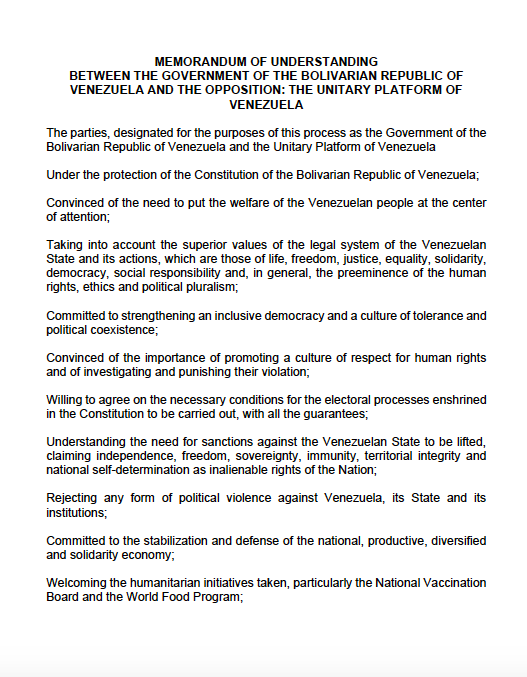
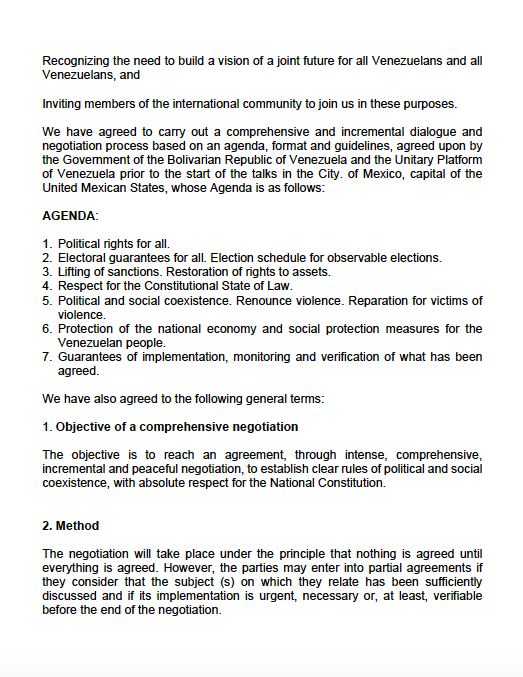
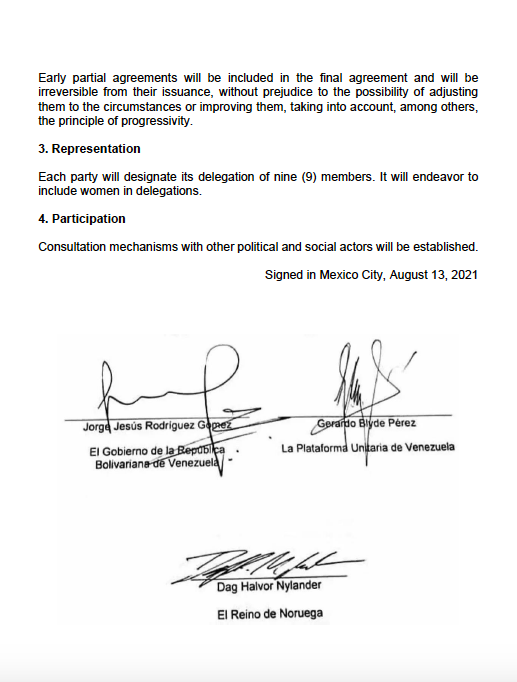







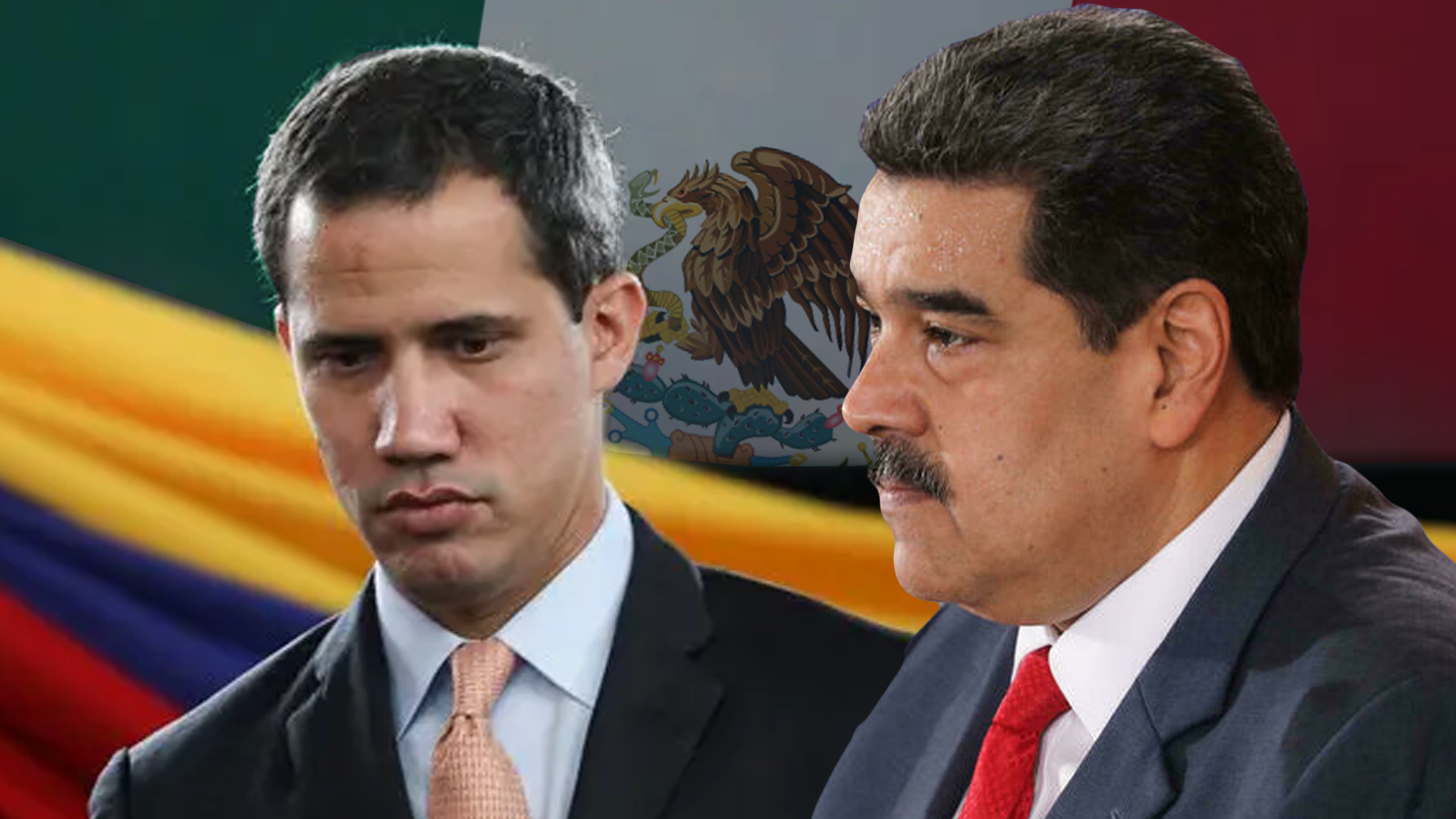
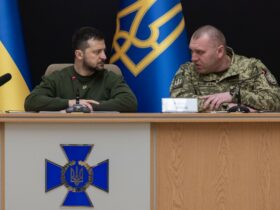








Leave a Reply